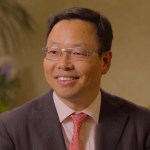David Wu, a chartered accountant by training, is also a member of PwC China’s Management Board, and also holds the following leadership roles: China Government and Regulatory Affairs Leader, North China Markets Leader and Beijing Senior Partner. In most western democracies, this would be a standard regulatory position. In a country like China, it’s a position considerably more challenging as figures like Wu have to navigate between the tensions inherent in a one-party state which is struggling to aspire toward a more predictable rule of law.
David Wu’s task of ensuring a functioning well regulated markets is complicated by the fact that China is in the midst of a politicized anti-corruption purge has roiled the ranks of the elite, toppling previously untouchable officials like former security czar Zhou Yongkang. A whiff of a cult of personality now surrounds China’s top leader, Xi Jinping, with major social science grants directed to academics who plan to study his speeches.
In many respects, China seems to be drifting back into something far more arbitrary and Maoist. Repression in China today is at its most severe point since the aftermath of 1989. Mainland political dissidents have been muzzled through both formal arrests and entirely off-the-books “disappearances. And over the past year, state authorities have increasingly resorted to televised public confessions by social media celebrities, foreign corporate investigators, and alleged terrorists — rather than statutes and trials — to send signals to society at large.
In the interview David Wu discusses the challenges and prospects that China is experiencing now and in the years ahead.
